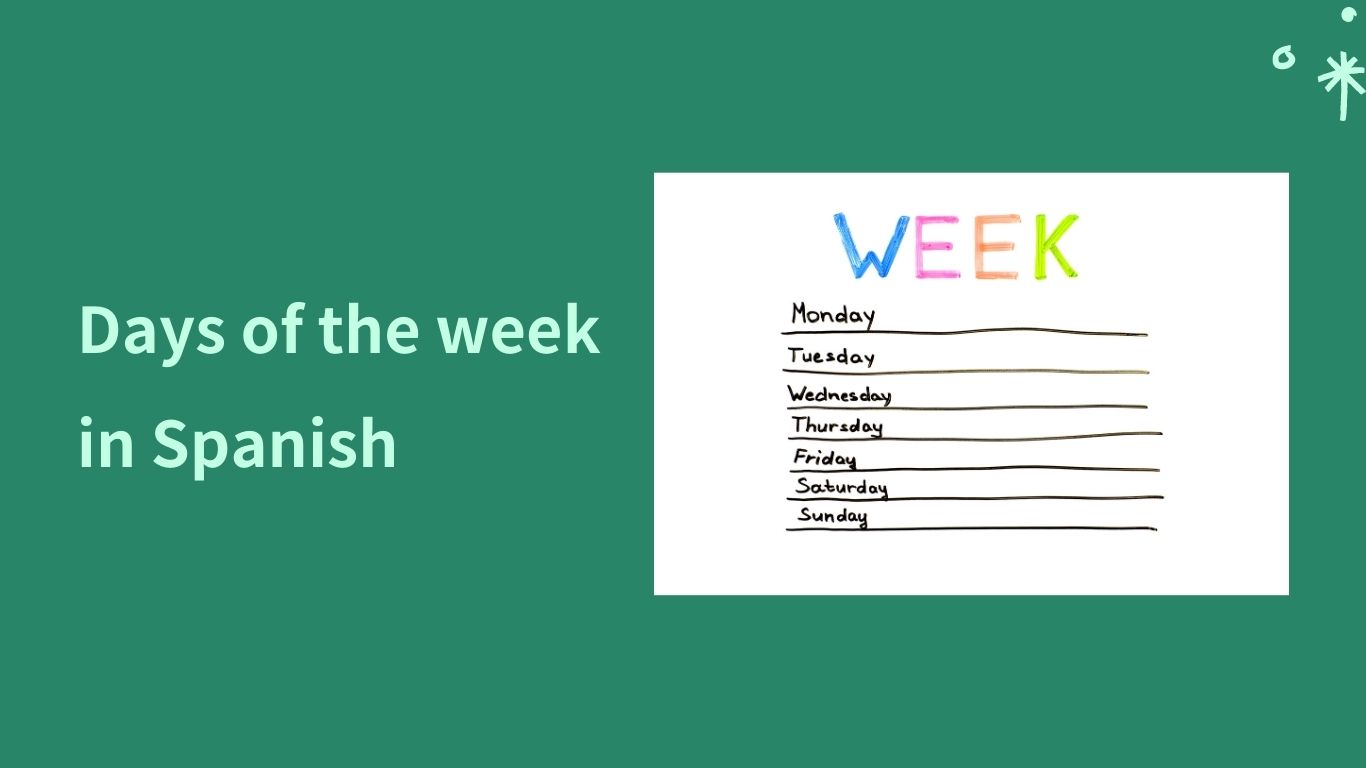Do you know the top seven Spanish words you should learn? The seven-day week! A crucial step toward developing a useful vocabulary is learning how to say the days of the week in Spanish. You are probably going to use these words quite a lot in your daily Spanish conversations.
One of the first things you learn when learning a language, whether it be Spanish or another one, is probably the days of the week. So without any delay, let’s dig into the days of the week in Spanish.
Spanish days of the week
| English | Spanish |
| Monday | lunes |
| Tuesday | martes |
| Wednesday | miércoles |
| Thursday | jueves |
| Friday | viernes |
| Saturday | sábado |
| Sunday | domingo |
Have you ever questioned why the names of the days of the week are what they are now? Well, the majority of the days of the week were given their original Greek or Roman names, which were taken from spiritual figures. You will see some Latin and Hebrew linguistic elements too:
- lunes: luna (the moon)
- martes: Marte (Roman god of war)
- miércoles: Mercurio (Roman god of commerce)
- jueves: Júpiter (Roman god of the sky)
- viernes: Venus (Roman goddess of love)
- sábado: sabat (Hebrew word for “rest”)
- domingo: Dominus (Latin word for “Lord”)
You can learn Spanish fast if you look at the origin of these words and their association with different figures and elements that existed in history. Now that, you know the days of the week in Spanish, it is important for you to understand how they are used in daily conversations as there are some easy rules associated with them.
How do you use the days of the week in Spanish
They are not capitalized
Days of the week in Spanish are never capitalized except if they are used at the start of the sentence.
They are masculine
This means that when you are referring to a day, you must use the masculine articles el, los, un and algunos. For example, if you want to say “the last Friday of the month was rainy” in Spanish, you say “el último viernes del mes fue lluvioso”.
‘On Monday’ cannot be translated into Spanish directly
In English, we use the preposition “on” to discuss events that take place on a particular day. You don’t need to include the word en, or any other preposition, in Spanish, so resist the urge to translate directly.
Use the pronouns el and los to denote “on” when referring to the days of the week. El is used to describe a single occurrence, and los is used to describe something that occurs frequently.
For example:
- Viene a Madrid el lunes. (She’s coming to Madrid on Monday.)
- Trabaja todos los sábados. (He works every Saturday.)
You add a‘s’ to make plural
Sometimes, you must refer to the days of the week in the plural. Only if the word does not already end in an s should you add an s to make the days of the week plural. The plural form of the word otherwise remains the same.
The plural forms of the days are:
- los lunes
- los martes
- los miércoles
- los jueves
- los viernes
- los sábados
- los domingos
Using these rules is essential in holding basic Spanish conversations. Keep them in mind so that you do not end up making errors and mistakes in your Spanish writing. Now we will look at some useful vocabulary words that are associated with the days of the week in Spanish. Make notes as these words are widely used in casual Spanish conversations.
Vocabulary associated with days of the week in Spanish
| English | Spanish | Example |
| Today is… | Hoy es… | Hoy es lunes.(Hoy es lunes.) |
| Tomorrow is… | Mañana es… | Mañana es martes.(Tomorrow is Tuesday.) |
| Yesterday was… | Ayer fue… | Ayer fue domingo.(Yesterday was Sunday.) |
| The day | El día | ¿Qué día es hoy?(What day is today?) |
| The date | La fecha | ¿Cuál es la fecha de hoy?(What is the date today?) |
| Next | El próximo | ¡El próximo lunes es mi cumpleaños!(Next Monday is my birthday!) |
| The upcoming… | Que viene… | Vamos a Barcelona el viernes que viene.(We’re going to Barcelona this upcoming Friday.) |
| The folllowing… | Siguiente… | No empieza el curso el próximo lunes, sino el lunes siguiente.(The class doesn’t begin next Monday, but rather, the following Monday.) |
| Last | Pasado | El sábado pasado, fuimos a la playa.(Last Saturday, we went to the beach.) |
| Previous | Anterior | No la vi el viernes pasado, sino el viernes anterior.(I didn’t see her last Friday, but rather, the previous Friday.) |
| The day before yesterday | Anteayer | Hoy es jueves, anteayer fue martes.(Today is Thursday, the day before yesterday was Tuesday.) |
| The day after tomorrow | Pasado mañana | Viene mañana, y pasado mañana se va.(He’s coming tomorrow, and the day after tomorrow he leaves.) |
| The week | La semana | Hay siete días en la semana.(There are seven days in a week.) |
| The weekend | El fin de semana | Este fin de semana voy a ver a mis amigas.(This weekend, I’m going to see my friends.) |
| Midweek | Entresemana | Viajo los fines de semana, pero me quedo en casa entre semana.(I travel on the weekends, but I stay at home during the week.) |
| Every | Cada/Todos los… | Cada jueves tengo clase de matemáticas./Tengo clase de matemáticas todos los jueves.(I have math class every Thursday.) |
| The first __ of the month | El primer __ del mes | Hay una fiesta el primer sábado de junio. (There is a party on the first Saturday of June.) |
| From __ to __ | De __ a __ | Trabajo de lunes a viernes.(I work from Monday to Friday.) |
| From __ to __ | Desde __ hasta __ | Estaré en Santo Domingo desde el lunes hasta el sábado.(I’ll be in Santo Domingo from Monday until Saturday.) |
If you are planning to learn Spanish online, italki can prove to be the best choice for you. With a large group of native Spanish teachers on italki has trained thousands of learners worldwide. These teachers train the learners to gain fluency and written and spoken Spanish with the help of different learning tools used in one-on-one learning sessions. You can book your preferred lessons with just a few clicks and start learning at your own pace.

Find Your Perfect Teacher
At italki, you can find your Spanish tutor from all qualified and experienced teachers. Now experience the excellent language learning journey!
Book a trial lesson
Some helpful tips to learn the days of the week in Spanish
- Every day, enter the complete date. You will remember the words and their proper sequence if you write down the date each day.
- Learn while singing. Spanish “days of the week” songs are abundant on YouTube.
- Create a new acronym. To remember them, make your own acronym using the first letter of each day.
- Your phone should now be in Spanish. Making your phone speak to you in Spanish by changing the settings can be a great way to continuously practice your language skills throughout the day.
Frequently asked questions
Q. What are the differences between Spanish and English days of the week?
A. A couple of important differences that can be noticed are that, in Spanish, the days of the week are not capitalized and they are all masculine.
Q. Why are days of the week in Spanish named after planets?
A. The reason for naming the days of the week after the planets were related to the belief that celestial bodies would control the first hour of each day.
Q. Why is it important to learn the days of the week?
A. Knowing the days of the week enables people to keep their schedules organized and to be aware of important dates.
Conclusion
You now possess all the necessary tools to discuss the days of the week in Spanish. In no time at all, you will be conversing in Spanish with ease. To get professional help, enroll yourself with italki to get guidance from native Spanish teachers. They will help you learn Spanish idioms, phrases, vocabulary, grammar, and rules of sentence formation with utmost ease.
Try to use these words in your daily conversations and that is how you will gain the confidence to speak Spanish in front of people.
Want to learn a language at italki?
Here are the best resources for you!




















